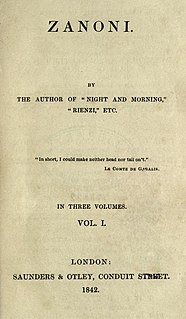 W
WThe Caxtons: A Family Picture is an 1849 Victorian novel by Edward Bulwer-Lytton that was popular in its time.
 W
WEugene Aram is a melodramatic novel by the British writer Edward Bulwer-Lytton first published in 1832. It depicts the events leading up to the execution of Eugene Aram in 1759 for murdering his business partner.
 W
WGodolphin is a satirical 19th-century British romance novel by Edward Bulwer-Lytton. It is about the life of an idealistic man, Percy Godolphin, and his eventual lover, Constance Vernon. Written as a frame narrative, Godolphin provides a satirical insight into the day-to-day lives of the early 19th-century British elite. The story is told through the narration of two protagonists, Percy Godolphin and Constance Vernon, as they rise to prominence among the London elite.
 W
WThe Last Days of Pompeii is a novel written by Edward Bulwer-Lytton in 1834. The novel was inspired by the painting The Last Day of Pompeii by the Russian painter Karl Briullov, which Bulwer-Lytton had seen in Milan. It culminates in the cataclysmic destruction of the city of Pompeii by the eruption of Mount Vesuvius in AD 79.
 W
WLeila; or, The Siege of Granada is a historical romance novel by Edward Bulwer-Lytton published in 1838.
 W
WPaul Clifford is a novel published in 1830 by English author Edward Bulwer-Lytton. It tells the life of Paul Clifford, a man who leads a dual life as both a criminal and an upscale gentleman. The book was successful upon its release. It is known for its opening phrase "It was a dark and stormy night...".
 W
WThe Coming Race is a novel by Edward Bulwer-Lytton, published anonymously in 1871. It has also been published as Vril, the Power of the Coming Race.
 W
WZanoni is an 1842 novel by Edward Bulwer-Lytton, a story of love and occult aspiration. By way of introduction, the author confesses: "... It so chanced that some years ago, in my younger days, whether of authorship or life, I felt the desire to make myself acquainted with the true origins and tenets of the singular sect known by the name of Rosicrucians." A manuscript came into his hands written in the most unintelligible cipher, a manuscript which through the author's own interpretation became Zanoni.